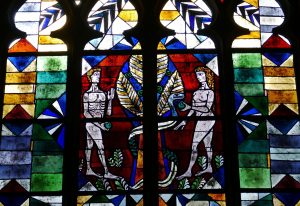what we belive
what we believe
Many people use the term “god”. However, not everyone means the same thing when they use the term god. Stating our doctrine allows us to be clear regarding what we mean and believe when we speak of God.
Further, we believe it is important to clearly spell out our beliefs as a matter of ethics. To do anything less would either communicate shame in our faith or a desire to deceive. Therefore, we hope you find our statement of faith to be bold, clear, and helpful.
In addition to what’s below, CityView affirms the Apostles’ Creed and the Nicene Creed. Furthermore, we subscribe to the Baptist Faith and Message 2000 (BFM2000) as a shared Confession. We also enjoy and appreciate the New Hampshire Confession of Faith (1833), from which the BFM2000 derives. Finally, while we additionally agree with – and are often helped by – The London Baptist Confession 1689, we would take a few exceptions and therefore consider it merely supplemental to the BFM2000.


The gospel
Matthew 4:17, 23; Matthew 24:14; Mark 1:14-15; Luke 4:18-19; Luke 7:22; Luke 16:16; Acts 14:15; Romans 1:16-17; 1 Corinthians 1:17-25; 1 Corinthians 9:16-18, 23; 1 Corinthians 15:1-8; 2 Corinthians 4:3-6; Galatians 1:6-11; Galatians 2:108; Galatians 3:7-9; Ephesians 3:6; Philippians 1:27; 1 Thessalonians 1:5; 2 Timothy 1:8-11; 1 Peter 4:6, 17
truth and revelation
We believe the Bible reflects the authority of its divine author – that it is both God-breathed and written by human hands – using the human authors’ personalities and writing styles seamlessly and in exact alignment with what God wanted to communicate to mankind, free from any conceptual error. We consider the Scriptures to include the books/letters found in today’s Protestant Bible and the content of the earliest copies of these books/letters to be the final written revelation of what God considered both sufficient and necessary for understanding and communicating what is needed for the Christian faith and life.
Additionally, the Bible contains everything that might be useful “for teaching, for reproof, for correction, for training in righteousness” (2 Timothy 3:16). We consider the Scriptures to be complete in their clarity inasmuch as one studies the Bible both in prayer and with interpretive integrity. For the consideration of those with a Catholic background, we do not consider the Apocrypha a part of the Scriptures as evidenced by the earliest historical records, but can appreciate its potential for historical value.
Deuteronomy 6:4-9; Proverbs 3:3-4; Proverbs 12:22; Jeremiah 33:6; Zechariah 8:16-19; John 1:14-18; John 8:31-32; John 14:6-7; John 17:17-19; Romans 4:23-25; Romans 15:4; 1 Corinthians 15:1ff.; Ephesians 1:13; Ephesians 4:25; Ephesians 5:6-10; Ephesians 6:14; Philippians 4:8-9; 1 Timothy 3:15; 2 Timothy 2:15; 2 Timothy 3:16-17; 2 John 1:2


god
As the Scriptures convey, all three Persons of our triune God are co-equal in every aspect of divine essence and nature, yet relate to one another in unique ways and carry out God’s mission through different roles with perfect, unified purpose and direction. Each member of the Trinity is not simply a different form of the same God, but are both distinct persons and yet also one.
Each person of the Trinity is fully God in both communicable and incommunicable qualities. Although we can know God is triune and understand many aspects of this seemingly paradoxical idea, we are limited by what God has revealed to us in the Scriptures. However, we believe that what we can understand about the Trinity is absolutely necessary and sufficient for understanding and knowing God in the way that He has chosen to reveal Himself.
We affirm the Nicene Creed on the Trinity
Genesis 1:26; Genesis 3:22; Genesis 11:7; Numbers 23:19; Deuteronomy 4:34, 39; Deuteronomy 6:4; 2 Chronicles 20:6; Job 11:7-11; Isaiah 33:5, 10; Isaiah 40:12-31; Isaiah 48:11; Nehemiah 9:6-37; John 10:30; 1 Corinthians 8:4; Ephesians 4:4-6; 1 John 4:8-10
god the father
We believe that in the Trinity, God the Father serves as both supreme authority and the ultimate receiver of all glory. Both the Son and the Holy Spirit are subject to the supremacy and sovereignty of the Father, while at the same time fully participating in and enjoying the sovereignty and glory of the Father.
The Father initiates all things, being the origin of all designs, gifts, provisions and work. The Father generously chooses, according to His will and purpose, to carry out his purposes inseparably from and in union with the Son and Holy Spirit – and by extension – people who trust the Son and are empowered by the Holy Spirit. The Father chooses to shine the spotlight of history and glory on the Son as the exact representation of Himself, while still receiving ultimate glory from the glory given to the Son.
The Father is worshiped equally with the Son and Spirit, yet is also the ultimate recipient of our worship and should be worshipped in spirit and in truth (John 4:24). The Father’s name is indicative of His father-nature toward His creation and his fatherhood is the ideal and highest form of fatherhood.
Exodus 4:22; Deuteronomy 32:6; 1 Chronicles 29:10; Isaiah 63:16; Matthew 3:17; Matthew 6:6, 9; Matthew 11:25-27; Mark 13:24-32; Luke 10:21-22; John 1:18; John 4:24; John 5:17-23; John 6:44-46; John 12:26-28; John 14:7-13; Romans 1:7; Galatians 1:1


god the son
Jesus fully and completely submitted to the will and pleasure of the Father while on His earthly mission. In His submission to the Father’s will and design, all things in history and outside of history are being brought under the kingship and rule of Jesus so that the Son can deliver the realized kingdom back to the Father for the Father’s glory (1 Corinthians 15:24-28). As such, the Gospel, the Christian life and all of creation history are centered and fixated on Jesus, the Son.
While on His earthly mission, Jesus submitted to the Holy Spirit in order to carry out the designs of the Father. Jesus, in turn, eternally exercises authority over the Holy Spirit, sending the Spirit (from the Father) into the hearts of those who are called to place their faith in the Son. In all things eternal, Jesus is given full glory and center-stage by the Holy Spirit as designed and willed by the Father. Jesus was born of the Virgin Mary – completely conceived by the Holy Spirit – so that He was born not of the flesh (and therefore not inheriting man’s sin-nature), but of the Spirit so that He would be the second and better “Adam”.
Still, while on His earthly mission, it was not Jesus’ divine nature, but His dependence and submission to the Holy Spirit that empowered Him to live a life of perfect godliness. As such, Jesus truly lived a life that was empathetic to the human condition while living a life fully and completely submitted to and empowered by the Holy Spirit. Thus, Jesus epitomizes the “abundant” life that humanity was meant to live as God’s image-bearers.
Genesis 3:15; Isaiah 53; Isaiah 61:1-3, 10-11; Psalm 22; Matthew 12:8; Luke 18:31-33; Luke 23:33-24:53; John 1:1-5, 10; John 14:6; Acts 2:22-36; 1 Corinthians 8:6; 1 Corinthians 15:3-8; Philippians 2:5-11; 2 Timothy 4:1; Hebrews 1:1-4; Hebrews 2:9-18; Revelation 22:10-21
god the holy spirit
Likewise, the Holy Spirit inhabits the life of those who trust in Jesus, both illuminating the will of God and enabling men and women to carry out the Father’s will. The Holy Spirit focuses all attention and glory toward Jesus – He does this through the Spirit-inspired, Jesus-focused Scriptures and through the Spirit-empowered Gospel-witness of Jesus’ disciples. This “witness” takes form both through verbal testimony concerning the Gospel of Jesus and through the Spirit-empowered life that people can live as reflective, image-bearers of God.
The Holy Spirit regenerates our hearts (or gives us new hearts) so that we are able to place our trust in the Son. The Spirit is also the One responsible for our continued growth in holiness. At the end of time, the Holy Spirit will gather those who have placed their faith in the Son into the eternal presence of the Father and Son.
Genesis 1:2; Exodus 35:31; Psalm 139:7; Isaiah 11:2; Ezekiel 37:11-14; Matthew 3:11; Mark 13:11; Luke 4:16-21; John 1:32-33; John 3:5-8; John 14:16-17, 25-26; John 15:26; John 16:7-14; Acts 1:8; Acts 2:2-4, 38; Acts 5:1-11, 32; Acts 10:44-47; Romans 8:1-27; 1 Corinthians 2:10-14; 1 Corinthians 12:3-11; Galatians 5:22-25


Man
Whereas God the Son is the exact representation of God the Father, man is only “like” God and a representative of God. Although he lacks the exact essential nature of God, man still carries a nobility and dignity that no other creation of God shares. The many ways in which man is like God and a representative of God is unlikely to be fully understood or revealed in an exhaustive way. However, we do know that our moral understanding, spiritual nature, mental capacities, creativity, relational intangibles and physical sensibilities give us but a brief understanding of the scope of our unique nature as God’s image.
Having been created in God’s image and likeness, Adam still chose to sin – taking on a new nature that is both foreign and opposed to God’s design. As such, the image and likeness that man enjoyed in the Garden of Eden has been distorted and damaged to the point of man losing his ability to choose right things without the intervention of God on man’s behalf. Our “nature” is now one of rebellion against God and humans are only able to choose God’s designs by the grace and animating power of God’s Spirit. When left to our own devices, we will be dragged into sin by our own desires (James 1:14).
We are sinners at birth and are both born into a corrupt world and are participants in that corruption. However, the stamp of God’s likeness remains – even though it is distorted or damaged and seemingly overcome by our sin nature. Through trusting in Jesus’ substitutionary death on the cross we are not only forgiven of our sins and rebellion, but are given the power – through the Holy Spirit – to recover more and more of the likeness and representation that was damaged and seemingly lost. For a Christian, this “progressive” recovery of the image of God culminates at Christ’s return when He will fully restore us to His likeness (Romans 8:29 & 1 John 3:2).
Genesis 1:26-28; Genesis 9:6; Psalm 8:3-8; Psalm 144:3-4; Proverbs 22:2; Ecclesiastes 2:14-16; Ecclesiastes 3:20; Isaiah 1:18; Isaiah 26:8; Zechariah 12:1; Acts 10:28; Acts 17:26; Romans 3:10-24; Romans 5:12-17; Romans 7:14-25; Romans 9:23; 1 Corinthians 11:7; 1 Corinthians 15:21-22; 2 Thessalonians 2:14; Titus 2:11-14; James 1:14; Revelation 21:3-7
salvation
Man would never seek God out without the Spirit giving him the power to do so. Further, man would never have the capacity to trust in Jesus without God gracefully giving him that power as well. When the Bible says “by grace you have been saved, through faith; and that not of yourselves, it is the gift of God” (Ephesians 2:8), we understand both grace and faith as being gifts from God.
While grace is rightfully understood as unmerited favor from God, we believe that even the faith it takes to accept grace originates in and grows by way of Jesus via the Spirit, not man’s efforts (Hebrews 12:2). Therefore, by God’s grace, love and mercy, some are foreknown, predestined, justified and glorified according to God’s pleasure and purposes. In practical terms, we believe that if a person is trusting in Christ and they “persevere” or endure to the end of their life, then they are what the Bible refers to as “predestined” or “the elect”.
Similarly, those who do not trust in Jesus are not predestined or elect. Contrary to man’s usual response to God’s sovereignty in these matters, we do not believe it serves any use – nor was it God’s intention – for people to worry or concern themselves over who has been elected and why. Judgment and eternal security are matters best left to the Judge and Eternal King. It is only man’s responsibility to play his part obediently in the unfolding of history and to participate in God’s work of saving people by proclaiming Jesus’ Gospel and showing His greatness through our growth in godliness. That said, man has agency and regardless of the invisible and unknowable procedures whereby God saves us, our response in faith and repentance is still necessary.
We consider any participation man might have in God’s work of saving people to be both a matter of responsibility and an unmerited grace that gives us great joy. We believe that salvation is an ongoing life-process whereby a follower of Jesus is “justified” (declared “not guilty”) by God, having been regenerated (born again) so as to exercise saving faith in Christ and are now being sanctified (made more like Jesus) throughout the remainder of one’s earthly existence. We will be glorified (the culmination of our salvation) at the end of this current world’s history, resulting in our full restoration.
Man’s glorification will include a bodily resurrection whereby our nature will be free of corruption and eternally present with our God in the “new heavens and earth”.
Leviticus 16:15-20; Matthew 20:28; John 6:35-40, 44-45; John 19:28-30; Romans 8-9; Romans 10:3-9; 1 Corinthians 1:21-25; 2 Corinthians 5:18-19; Galatians 3:13; Galatians 4:4-5; Ephesians 1:3-23; Ephesians 2:4-10; Colossians 1:19-23; 2 Thessalonians 2:13-14; Hebrews 2:14-18; Hebrews 6:17-20; Hebrews 9:24-28; 1 Peter 1:8-12; 1 Peter 3:18; Revelation 5:9


the church
Regardless of the many imperfect expressions of Jesus’ Church, we should never waiver from our devotion and loyalty to her, because it is His chosen vessel for taking His Gospel to the world. Any attempt to engage in God’s mission without the Church are both lacking in divine power and more susceptible to corruption due to the unknown nature of God’s involvement in things that are not of His intended design. Therefore, we consider active engagement with a local church to be vital to anyone who proclaims to follow Christ.
We believe the local church has always had many unique and indigenous expressions, but one mission (Matthew 28:18-20). A church is a biblically cultured church when it is faithfully preaching and teaching the Gospel from the Scriptures and refuting any error that might be brought into the fellowship. A church is a biblically cultured church when it is faithfully administering the ordinances that have always been administered throughout Church history – believer’s baptism and the Lord’s Supper (or Communion).
A local church is being a biblically-cultured church when it is communally offering worship to God, serving and admonishing the world and one another while proclaiming the Gospel both to individuals and to the extent of nations. A church is a biblically-cultured church when its members are being trained to grow in the likeness of Christ. A church is biblically-cultured when it is consistently sending forth its members to engage the world, making disciples of Jesus and expanding God’s family. A local church is being a biblically-cultured church when it is led or governed by qualified elders (also referred to as pastors).
2 Chronicles 6:1-7:3; Psalm 11:4; Psalm 27:4-6; Matthew 16:18-19; Matthew 28:19-20; Acts 1:8; Acts 2:40-47; Acts 6:2-6; Acts 20:28; Romans 10:12-13; 1 Corinthians 1:10-13; 1 Corinthians 11-12; Galatians 6:1; Ephesians 3:19-22; Ephesians 4:11-16; Ephesians 5:27-29; 1 Thessalonians 5:12-13; 1 Timothy 3:1-16; 1 Timothy 5:17-22; Titus 1:5-16; Hebrews 9:1-14; Hebrews 13:7, 17; 1 Peter 5:1-3; Revelation 13:6; Revelation 21:3
final things
We undoubtedly believe that Christ’s return has significant bearing on our day-to-day living. We are commanded to be prepared and expectant. We also believe that we are called to labor for the growth of the Kingdom of God as we await His return. However, outside of the key, obvious particulars of Jesus’ return, little is gained by taking a detailed stance (as a church) about biblically unspecified details and we are completely opposed to a dogmatically nuanced, end-times belief system that becomes a hindrance to fellowship and a source of contention between Christian brothers.
As for eschatological systems, we consider Historical Premillennialism, Amillennialism and Postmillennialism to be historically respectable positions. We consider dispensationalism to be novel and highly questionable due to the strained biblical hermeneutic required to affirm such a system.
Job 19:25-26; Psalm 96:13; Joel 2-3; Matthew 16:27-28; Matthew 24-25; Mark 13; Luke 17:22-37; John 14:3; Acts 1:7-11; Acts 17:31; 1 Corinthians 4:5; 1 Corinthians 15:20-28; Philippians 3:20-21; 1 Thessalonians 4:13-18; 1 Thessalonians 5:2-3; James 5:7-9; 2 Peter 3:8-14; 1 John 3:2; Revelation 20:11-15; Revelation 22:12

